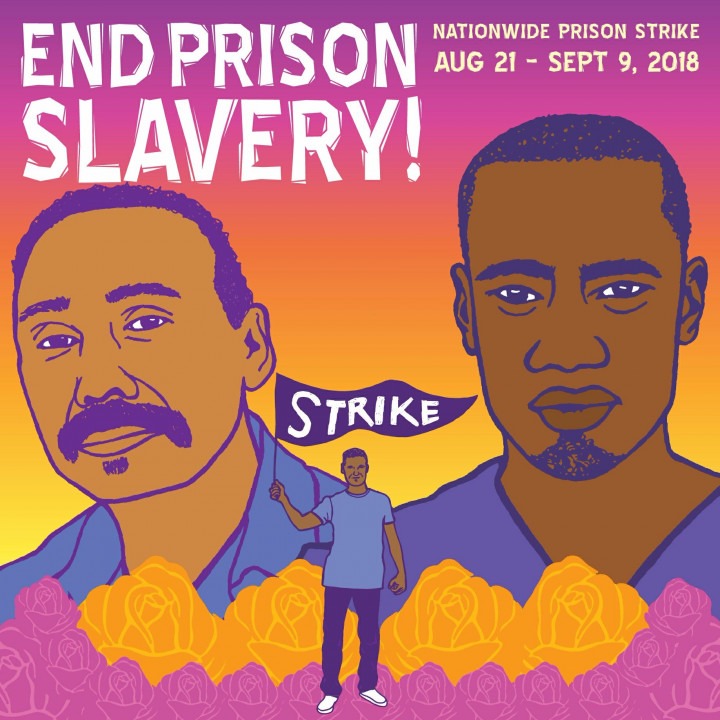 The last day called for the national prison strike was Sunday, September 9. As we’ve reported over the last couple of weeks, details on exact numbers and the kinds of actions that people incarcerated have participated in can be hard to verify. So, not a complete list, but organizers have confirmed 33 actions across 15 states and Nova Scotia, Canada. A list of verified actions can be found here.
The last day called for the national prison strike was Sunday, September 9. As we’ve reported over the last couple of weeks, details on exact numbers and the kinds of actions that people incarcerated have participated in can be hard to verify. So, not a complete list, but organizers have confirmed 33 actions across 15 states and Nova Scotia, Canada. A list of verified actions can be found here.
There has also been some retaliations against strike leaders. Jailhouse Lawyers Speak's (JLS) Amani Sawari:
Incarcerated leaders like Jason Walker continue to suffer from abusive treatment and staff harassment, Imam Hasan has been placed on a one year ban from outside communications and Kevin Rashid Johnson just went up for another transfer trial and is being sent for another out-of-state transfer. They are shipping organizers like cargo and JLS members are being hunted like animals as officials try to pluck them out of general population and tear them down due to the amazing work that they were able to to complete these past few weeks.
The best way to keep up with news and solidarity actions in support of JLS organizers inside is to follow Amani Sawari, JLS's communications leader at http://sawarimi.org.
The strike was a pretty huge success from a media standpoint. There was coverage of the strike in major media outlets, such as the New York Times, Washington Post, and the Guardian. It was covered in a variety of smaller presses and blogs as well. Compared to the prison strike in 2016, which garnered very little national press, this strike captured people’s attention and hopefully will help move forward the reform agenda.
James Kilgore had a great article in Truthout, detailing the success of the media campaign and providing details on the organizations coordinating the work of those incarcerated and allies. In this section Kilgore discusses potential impacts of the strike actions.
As with any mass action in a repressive setting like a prison, there will be backlash from prison authorities. From the 2016 strike, leaders like Kinetic Justice of the Free Alabama Movement and Malik Washington, founder of the End Prison Slavery Texas Movement, have suffered long periods in solitary confinement. Already, those identified as “instigators” in Texas, Ohio and South Carolina reportedly have been sent to isolation. No doubt there will be more efforts by authorities to punish, vilify and isolate those they identify as leaders
Optimistic outcomes of the 2018 actions would be the restoration of Pell Grants, a measure already partially in motion, and a repeal of the Prison Litigation Reform Act. As Darren Mack said, “It’s urgent that elected officials respond to the 10 policy demands in order to tackle the systemic problems of mass incarceration and racist criminal justice policies that have led to tragic events like the Attica massacre and devastated millions of lives.”
But regardless of actions by elected officials, as Heather Thompson observed, “No matter how many folks were actually able to sit in or stop working or not eat, on the outside, vital attention was drawn to the issue of how horrific prison conditions are and also the longer history of prisoners standing up to be heard at places like San Quentin and Attica.”
The action, called by the Incarcerated Workers Organizing Committee and organized with Jailhouse Lawyers Speak, was built around 10 demands. As a reminder (these need to be repeated over and over):
These are the NATIONAL DEMANDS of the men and women in federal, immigration, and state prisons:
[You can sign a petition here to send a statement of support of these demands to members of congress.]
- Immediate improvements to the conditions of prisons and prison policies that recognize the humanity of imprisoned men and women.
- An immediate end to prison slavery. All persons imprisoned in any place of detention under United States jurisdiction must be paid the prevailing wage in their state or territory for their labor.
- The Prison Litigation Reform Act must be rescinded, allowing imprisoned humans a proper channel to address grievances and violations of their rights.
- The Truth in Sentencing Act and the Sentencing Reform Act must be rescinded so that imprisoned humans have a possibility of rehabilitation and parole. No human shall be sentenced to Death by Incarceration or serve any sentence without the possibility of parole.
- An immediate end to the racial overcharging, over-sentencing, and parole denials of Black and brown humans. Black humans shall no longer be denied parole because the victim of the crime was white, which is a particular problem in southern states.
- An immediate end to racist gang enhancement laws targeting Black and brown humans.
- No imprisoned human shall be denied access to rehabilitation programs at their place of detention because of their label as a violent offender.
- State prisons must be funded specifically to offer more rehabilitation services.
- Pell grants must be reinstated in all US states and territories.
- The voting rights of all confined citizens serving prison sentences, pretrial detainees, and so-called “ex-felons” must be counted. Representation is demanded. All voices count!
Work will continue to make these demands a reality!! Stay connected with, and support these groups:
Incarcerated Workers Organizing Committee
__________________________________________
Read more about InAlienable.
Support the InAlienable program!
__________________________________________


Comments
The 8 Most Impo... (not verified)
[…] the Free Alabama Movement and the Incarcerated Workers Organizing Committee, the strike reportedly reached at least 33 facilities in 15 states and lasted for 19 days. Prisoners participated in work […]